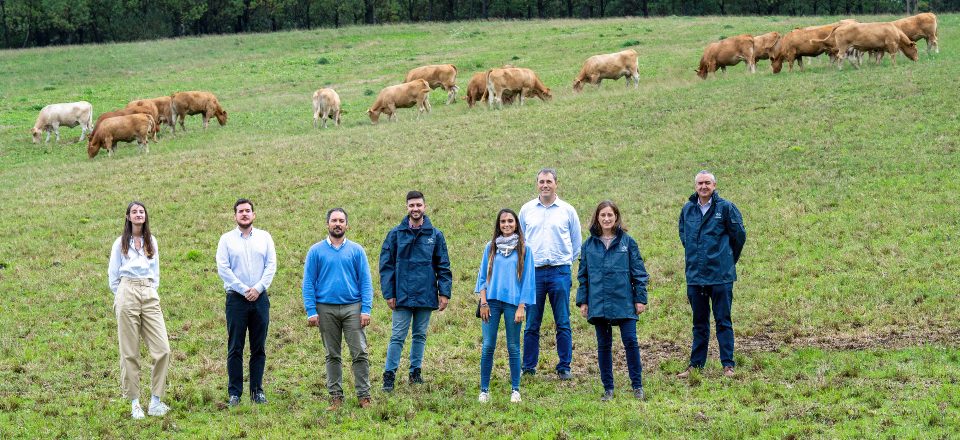
Repsol, Naturgy, and Reganosa collaborate with Impulsa Galicia to transform waste into biomethane and organic fertilizers
- Once the necessary approvals are received, the three energy companies plan to invest €146 million in the initial phase to generate 300 GWh of renewable energy per year using 1.2 million tons of surplus livestock manure.
- The first production facility is planned in Meirama, with five associated pretreatment centers.
- The initiative would reduce dependence on foreign energy and develop the circular economy in the northern Spanish region of Galicia. When fully deployed, it is expected to create up to 600 direct jobs and 1,900 indirect jobs. In addition, it will avoid the emission of 500,000 tons of CO2 equivalent per year.
- With this project, the companies contribute to the decarbonization of Galician transport, industry, and agri-food activity.
- The project has been presented to four ministries of the central government with the aim of being included in the Next Generation funds.

Repsol, Naturgy, and Reganosa are collaborating with Impulsa Galicia to develop the circular economy with a project that would transform surplus livestock manure and other waste into biomethane, organic fertilizers, and neutral CO2 of biological origin, on a large scale. This initiative has been conceived to optimize slurry management in the northern Spanish region of Galicia, reduce dependence on foreign energy, facilitate compliance with new European standards, and help decarbonize industry, households and mobility. The promoters are currently carrying out field work and tests that build on months of previous studies and research.
The project consists of the phased deployment of a network of plants to commercialize surplus slurry from cattle, pigs, and poultry mixed with a smaller amount of organic fraction of separated collection and organic industrial waste from the agri-food sector for the production of renewable energy. This reflects the memorandum of understanding recently signed by Reganosa, Repsol, Naturgy, and Impulsa, the joint venture promoted by the regional government of Galicia with the aim of supporting business initiatives that have an impact on the revitalization, progress, and transformation of the regional economy through the implementation of a green and digital model.
In the initial phase, the three energy companies plan to build an anaerobic digestion plant to produce renewable gas as well as five associated pretreatment plants to dehydrate surplus bovine slurry. The renewable gas generation plant is planned to be located in Meirama (Cerceda), an area defined as a Just Transition Zone. The five pretreatment plants would be distributed in different municipalities in the provinces of A Coruña and Lugo, with distribution based on the Galician map of livestock farms to optimize the logistics between both types of facilities.
With an investment of approximately €146 million, in this first phase 1,240,000 tons of surplus slurry would be treated annually and, in addition to organic fertilizers and neutral CO2, some 300 gigawatt hours (GWh) of biomethane would be produced and injected into the natural gas network. This renewable gas would be used to decarbonize different sectors, such as transport, residential, and industrial, and it could be used in the processes of the Repsol refinery in A Coruña.
Extension to all Galicia
Once this initial phase has been completed, the intention of the promoters is to extend the circular economy project in the future to the whole of Galicia, implementing a centralized network for the treatment of surplus livestock manure. This system will guarantee the availability to farmers of the slurry needed to fertilize their land in a sustainable way, as well as the economic viability of their farms. According to the promoters' calculations, around 6 million tons of waste could be recovered each year. The biomethane produced (1 TWh per year) would be equivalent to nearly 7% of the imported natural gas now demanded in Galicia, which would substantially advance the community's energy autonomy and the consumption of renewables. The project has been presented to four ministries of the central government (Economy, Ecological Transition, Agriculture and Industry) with the aim of including it in the Next Generation funds, both for its circularity component and for the fact that it provides a source of green and indigenous energy from the surplus of livestock excrement.
The overall project would avoid the emission into the atmosphere of some 500,000 tons of CO2 per year and would create quality employment within the framework of the ecological transition and in sparsely populated areas. The project is expected to generate slightly more than 600 direct jobs and 1,900 indirect jobs, including both the operation of the plants and the transport logistics.
The implementation of this initiative would contribute to the compliance with the new European environmental legislation on agricultural soil protection and effluent control, as well as sustainable agricultural soil nutrition, and it would provide a solution to recurring problems in the administration of slurry.
Innovative in its concept of global integration as opposed to dispersion, this project also exemplifies the new model of public-private cooperation and cooperation between companies in the same sector and is open to the participation of other companies.
Repsol's Director of Renewable Fuels, Berta Cabello, indicated that "with this project, that is strategic for Repsol, we are promoting the reduction of greenhouse gas emissions from transport and industry, increasing energy autonomy by using renewable gases obtained from local resources and, at the same time, promoting the circular economy and the sustainability of such an important sector in our country as the livestock sector.”